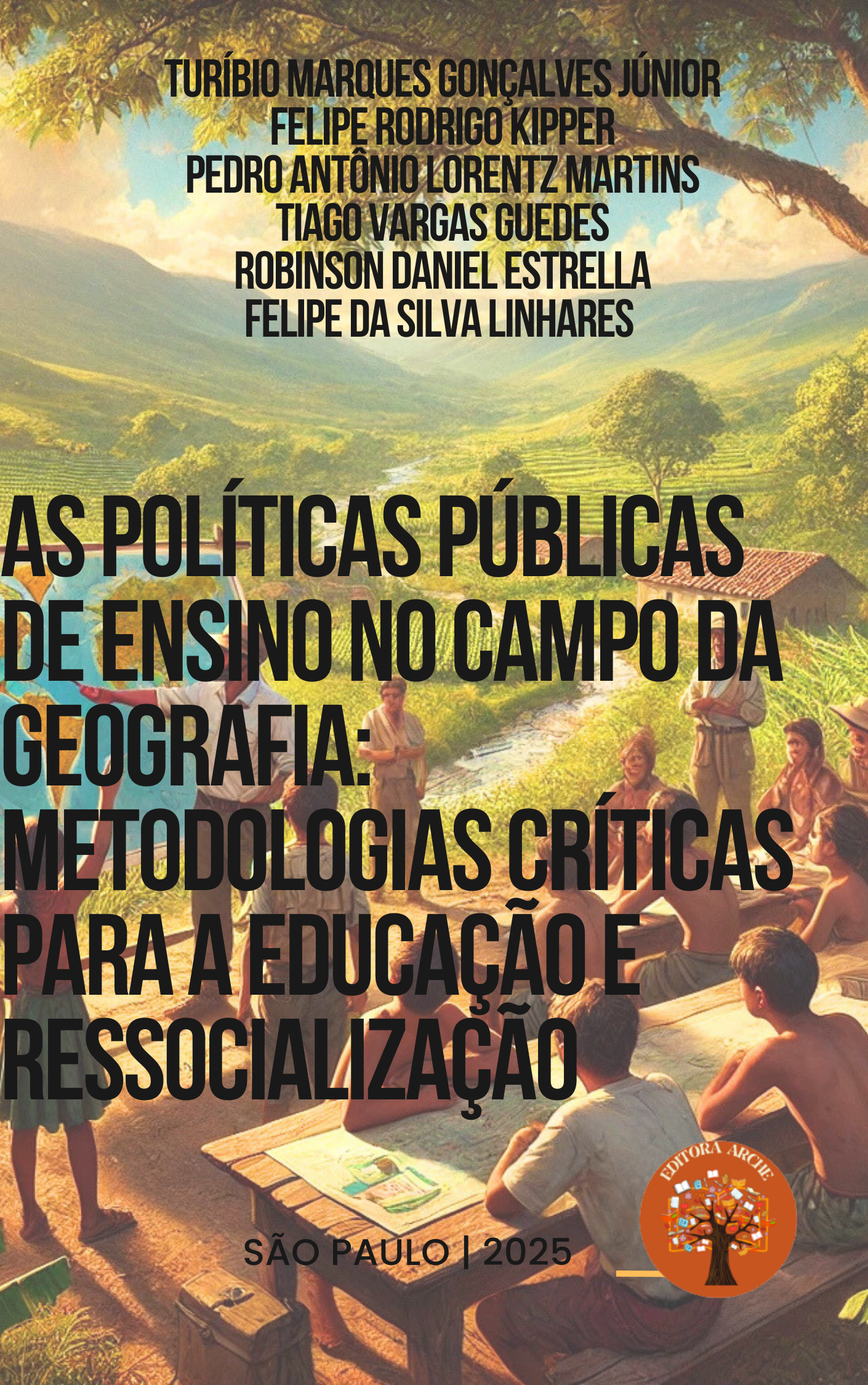PUBLIC POLICIES OF TEACHING IN THE FIELD OF GEOGRAPHY: CRITICAL METHODOLOGIES FOR EDUCATION AND RESOCIALIZATION
Keywords:
Geography. Learning Ressocialização.Abstract
Education is one of the fundamental pillars for the social, economic and cultural development of a nation. In the contemporary context, the discipline of Geography assumes a central role in the formation of critical citizens, aware of their reality and capable of interacting with space in an active and transformative way. This digital book, entitled "Public Teaching Policies in the Field of Geography: Critical Methodologies for Education and Resocialization", proposes a deep and detailed analysis of the educational guidelines aimed at teaching Geography, bringing reflections on pedagogical innovation, critical methodologies and strategies for meaningful learning.
The purpose of this work is to offer a comprehensive overview of the educational policies that guide the teaching of Geography, analyzing how these guidelines can be applied to promote a truly transformative education. Geography, more than a school subject, is a science that enables the understanding of spatial, social and environmental dynamics, being essential for citizenship formation and for the development of critical thinking.
Throughout this book, readers will find an approach that combines theory and practice, discussing not only the epistemological bases of Geography, but also the challenges and potentialities of teaching this discipline within the school and in contexts of resocialization. The work is structured in three main chapters, each addressing an essential aspect of geographic education and its impact on the formation of the subject.
CHAPTER 01 – Teaching Geography and Citizenship: Reflections on Pedagogical Innovation and the Role of the Educator. In the first chapter, we delve into the relationship between the teaching of Geography and the construction of citizenship. Geography, by studying the interactions between society and space, plays a crucial role in the formation of critical and participatory subjects.
Here, we discuss the need for pedagogical innovation and educational practices that allow students to understand the world in which they live, appropriating geographical knowledge to interpret and intervene in reality. The chapter highlights the importance of the educator as a mediator of this process, emphasizing his responsibility in choosing approaches that value the students' protagonism and stimulate critical reflection.
In addition, public educational policies that directly impact the teaching of Geography are analyzed, as well as the challenges faced by teachers to balance theory and practice in a scenario marked by inequalities and institutional restrictions. The debate on active methodologies and new technologies in the teaching of Geography also gains prominence, pointing out ways for an innovative and effective education.
In CHAPTER 02 – Experiential Learning: The Importance of Practical Activities in the Construction of Knowledge. The second chapter deals with the relevance of experiential learning in the teaching of Geography. More than transmitting theoretical content, Geography should provide experiences that allow students to establish relationships between academic knowledge and their daily experiences.
The purpose of this chapter is to demonstrate how active methodologies, such as fieldwork, interdisciplinary projects, didactic games and the use of geospatial technologies, can make learning more dynamic and meaningful. The chapter explores the contributions of constructivist and sociocultural approaches, showing how practical experience enhances the assimilation of geographic content and expands students' critical capacity.
In addition, examples of successful pedagogical practices are presented, which illustrate how Geography can be taught in an interactive way, promoting greater student engagement and strengthening their relationship with the space in which they live. The chapter also highlights the importance of formative assessment and learning monitoring instruments that value the student's role in the educational process.
In the third and last chapter, "Geography as a Bridge Between Reality and Knowledge: Strategies for Dynamic and Meaningful Teaching", we deepen the discussion on the dynamic and meaningful teaching of Geography, emphasizing the importance of pedagogical strategies that connect theory and reality. Geography, when investigating the relationships between different spatial, social and environmental phenomena, should be taught in order to bring the student closer to his reality and stimulate his capacity for analysis and critical interpretation. The chapter presents innovative methodologies that favor this approach, such as the use of interactive maps, debates on current socio-environmental problems and the integration between Geography and other disciplines. In addition, an analysis is made of the role of public policies in promoting a more inclusive and democratic education, highlighting the need for a curriculum that contemplates diversity and allows students to understand their position in the space geographic.
Finally, the chapter discusses the impact of the teaching of Geography in contexts of resocialization, showing how this discipline can contribute to the reconstruction of the identity and citizenship of individuals in situations of social vulnerability. The digital book, "Public Teaching Policies in the Field of Geography: Critical Methodologies for Education and Resocialization" is an essential work for educators, researchers and educational policy makers who seek to understand and improve the teaching of Geography. Through a critical and innovative approach, this book proposes reflections on the role of Geography in citizenship education and presents paths for a more dynamic, interactive teaching that is aligned with contemporary demands. By emphasizing the importance of practical activities and the connection between knowledge and reality, the work contributes to a broader and more transformative vision of geographic education, encouraging pedagogical practices that promote and the active participation of students.
With this reading, it is hoped to foster the debate on the potential of teaching Geography and inspire educators to adopt methodologies that expand the possibilities of learning, making education a true instrument of social emancipation and construction of a fairer and more sustainable future.
Turíbio Marques Gonçalves Júnior
Felipe Rodrigo Kipper
Pedro Antônio Lorentz Martins
Tiago Vargas Guedes
Robinson Daniel Estrella
Felipe da Silva Linhares
Downloads

Downloads
Published
How to Cite
License
Atribuição CC BY
